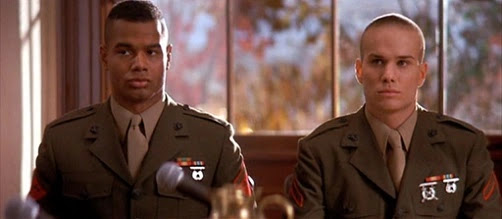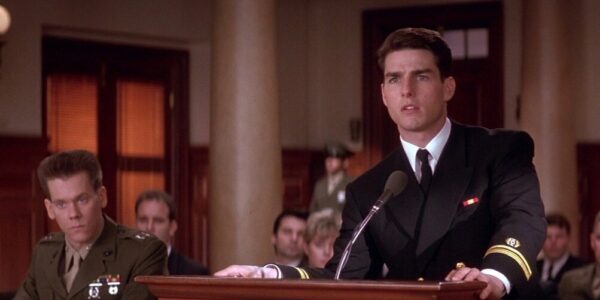Aaron Sorkin penned the play A Few Good Men from a conversation he had with his sister over the phone. Deborah was in the middle of a stint with the U.S. Navy JAG Corps and had been sent to Guantanamo Bay to defend a group of ten Marines who had nearly killed a fellow Marine during a hazing that had been ordered by their superior officer. The incident inspired Aaron and he spent his days at work jotting down notes and ideas on napkins and transcribing those notes in the evening into a play. That play was then sold to producer David Brown who struggled to find a studio that was interested in it. Eventually Group Canal+ agreed to finance it with assistance from Castle Rock Entertainment and producing partner Rob Reiner who wanted to direct it.
Production started out rough with the U.S. Department of Defense refusing access to Camp Pendleton in large part due to objections to the depiction of military personal in the film. They did allow 200 off-duty Marines to serve as extras on the production, though, although not in the iconic opening scene with the rifle ceremony. That scene was instead performed by a group of college students who practiced for the shot relentlessly until they had it down perfectly. It was then filmed in such a way as to augment the choreography and open the film on an impressive note, signifying the unity and perfection of the Marines.
By basing the play, and film, so heavily on a real-life case and not securing permission to do so, Aaron Sorkin opened the production to legal issues. Indeed, several of the Marines who were involved in the original trial came forth and sued the production for millions of dollars. One of the potential plaintiffs, David Cox, was mysteriously murdered before he could join in on the suit. Ultimately the lawsuit was deemed without merit and dismissed.
The story revolves around an incident at Guantanamo Bay, Cuba when a young Marine named William Santiago is tied and beaten in the middle of the night. After he is found dead, Lance Corporal Harold Dawson (Wolfgang Bodison) and Private First Class Louden Downey (James Marshall) are arrested and accused of murder, facing a court-martial. Their defense is assigned to U.S. Navy JAG Corps Lieutenant Daniel Kaffee (Tom Cruise), a young lawyer known for his abilities to arrange plea bargains for his clients rather than go through lengthy court hearings. Assisting with the proceedings is Lieutenant Commander Joanne Galloway (Demi Moore), Kaffee’s superior officer, who suspects there is more to the story and wants to dig deeper. Rounding out the defense is Lieutenant (junior grade) Sam Weinberg (Kevin Pollak), a glorified gofer who is there primarily to aid in the trial research. He will play a pivotal role in the finale providing “witnesses” to undermine the testimony of one of the key players.
Kaffee sees an opportunity to plead the case guilty and get the two accused soldiers minimum sentences but Dawson, who speaks literally for both of the accused, refuses the offer, insisting on a trial believing the two will be exonerated for the incident. Galloway agrees with the trial, believing that the two were ordered by a superior officer to conduct a “Code Red,” an unofficial act involving men in the unit to use hazing tactics to bring an underperforming member of the unit back into line. Recently Code Reds had been officially banned from use but Galloway believes they are still being done in Cuba and wants to pin down the officer responsible for the order.
Dawson and Downey’s superior officer First Lieutenant Kendrick (Kiefer Sutherland) claims to have issued an order to leave Santiago alone, an order witnessed by the whole Unit. However, Dawson claims that after the Unit was dismissed Kendrick gave a second order to them specifically to perform the Code Red. Proving this, however, seems impossible as it is a matter of one man’s word against another. On top of that, Kendrick’s superior officer, Lieutenant Colonel Markinson (J.T. Walsh) has disappeared, going AWOL, despite being subpoenaed to testify. His supervisor and head of the base in Cuba, Colonel Nathan Jessep (Jack Nicholson), backs up the testimony of Kendrick as well as insisting that Santiago was being transferred off the base and back state-side and therefore would not have needed a Code Red. Something doesn’t add up and eventually Kaffee decides that, with the help of his team, he will figure out who is actually responsible for the death of Santiago and bring them to justice in the courts.
Thera are a lot of things to keep track of in this plot heavy film and it is to Rob Reiner’s and Aaron Sorkin’s credit that it is so easy to follow all the threads of it. They’re not interested in hiding who all is involved in the conspiracy, though, as much of what we need to know happens in the opening scene on screen. We get the gist of the situation in that opening moment and it will be up to Kaffee and his team to unravel what we mostly know already. This is further emphasized when the defense arrives at Cuba and meets Jessep. Almost immediately Jessep is answering questions with answers we know are false, contradicting what we saw in the opening scene. Often when a film puts us ahead of the investigators it makes for an uninteresting mystery because we are impatiently awaiting the leads to catch up to us. That is not the case here. This is written so well that even though we are ahead of the defense there are still things we don’t know and mysteries to be worked out. One that should have tipped me off but didn’t was the revelation that Santiago’s gear was still hanging up in his closet despite Jessep insisting he was being transferred and leaving the base the morning he died. The film shows us the hanging clothes but doesn’t spoon feed the significance of that until it comes out in trial.
This is touted as an actors movie, the type where all the leads deliver outstanding performances and critical acclaim. Unfortunately that is not the film I saw. Jack Nicholson is the stand-out, chewing the scenery as only he can, but it only really stands out because he is so much better than those around him. J. T. Walsh and Kiefer Sutherland come across neutered primarily because they so often share their scenes with him. He is an overbearing presence that draws all attention to himself whenever he is there. In this case a little goes a long way and it is a good thing he is used so sparingly. Kiefer gets just one scene out of that shadow and he is stiff and lifeless. J. T. however, shines in his few moments away from that shadow. Usually he plays antagonistic roles, especially when he is in military parts, but here he is a sympathetic character, albeit one that is still a bit of an enigma and underutilized.
Tom Cruise plays the arrogant lawyer part as well as he ever does but when asked to convey the complexities of a man in conflict he can’t quite do it. Watch the scene when he is debating with Dawson over taking the plea deal and you can see an actor in over his head. Tom Cruise is capable of some great performances but that talent is rarely on show here. He is skating by on his charisma alone. The same can be said for Demi Moore who just can’t convincingly get across her frustration with Kaffee. When she is lashing out at him after their first meeting you can really see the actress behind the character, trying to emote and struggling to be convincing at it. She shines in other scenes, though, like when she is pushing through Kaffee’s defenses to get out some hard questions towards Jessep during their only trip to Guantanamo, but mostly her character falls too often into a background supporting role. Tom Cruise and Jack Nicholson are the big name actors in this picture and all the other characters take a backseat to them, accordingly.
The mystery, such as it is, drives the story and its resolution is mostly satisfactory. At this point in time, thirty+ years after it initially released, that scene when Jessep is on the witness stand has become synonymous with this film. It is definitely a high note to end on. Unfortunately the film doesn’t end on that scene. Instead, the filmmakers felt the need to moralize just a little bit more and include a clunky scene between Dawson and Downey where Dawson has to explain, on the nose, exactly what they did wrong when they followed the order to haze Santiago. This scene is completely unnecessary and is out of character with Dawson’s attitude leading up to this moment. It feels tacked on and sucks out the life of a rousing final act.
A Few Good Men is a well crafted, well written legal drama that unfortunately overthinks its message in the final act. Some of the acting is strong but it relies too much on the personas of the actors cast in the lead roles. This is by no means an actor’s film in the sense that it doesn’t require them to stretch and give strong, nuanced performances. Instead, it plays to who they are more than who the characters are and is the lesser for it. Still, it is well written and entertaining, giving us just enough of a mystery to maintain interest. Rob Reiner crafted a confident story to spend a few hours on, but it just doesn’t quite live up to its lofty potential.
Academy Award Nominations:
Best Picture: David Brown, Rob Reiner and Andrew Scheinman
Best Supporting Actor: Jack Nicholson
Best Film Editing: Robert Leighton
Best Sound Mixing: Kevin O’Connell, Rick Kline and Robert Eber
____________________________________________________
Release Date: December 11, 1992
Running Time: 138 Minutes
Rated R
Starring: Tom Cruise, Jack Nicholson, Demi Moore, Kevin Bacon, Kevin Pollak, Wolfgang Bodison, James Marshall, J.T. Walsh, and Kiefer Sutherland
Directed By: Rob Reiner









Comments
Post a Comment